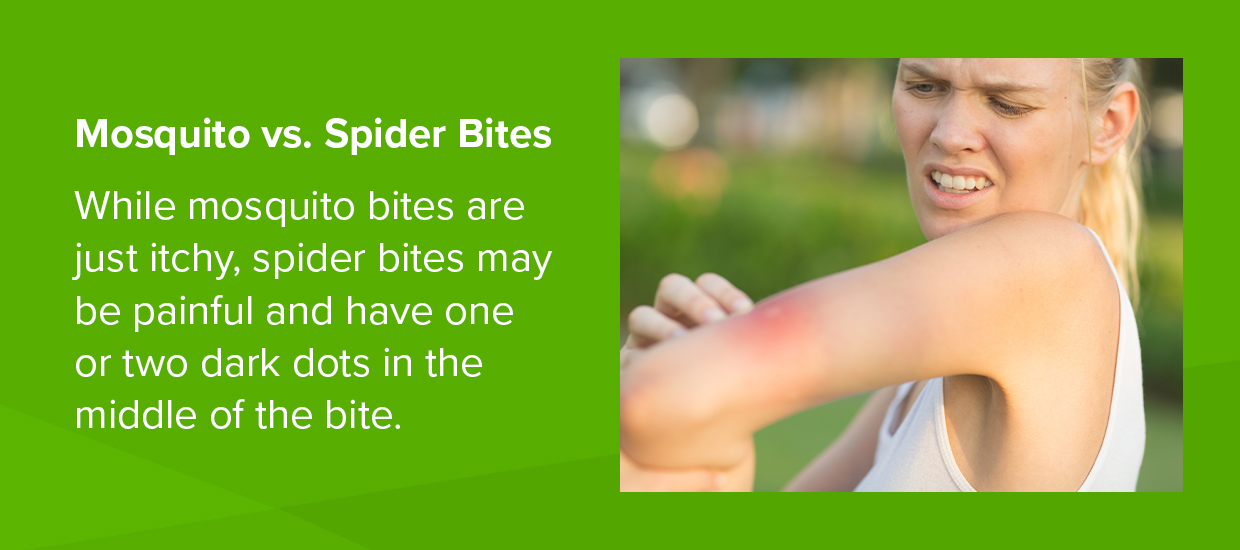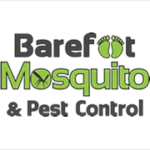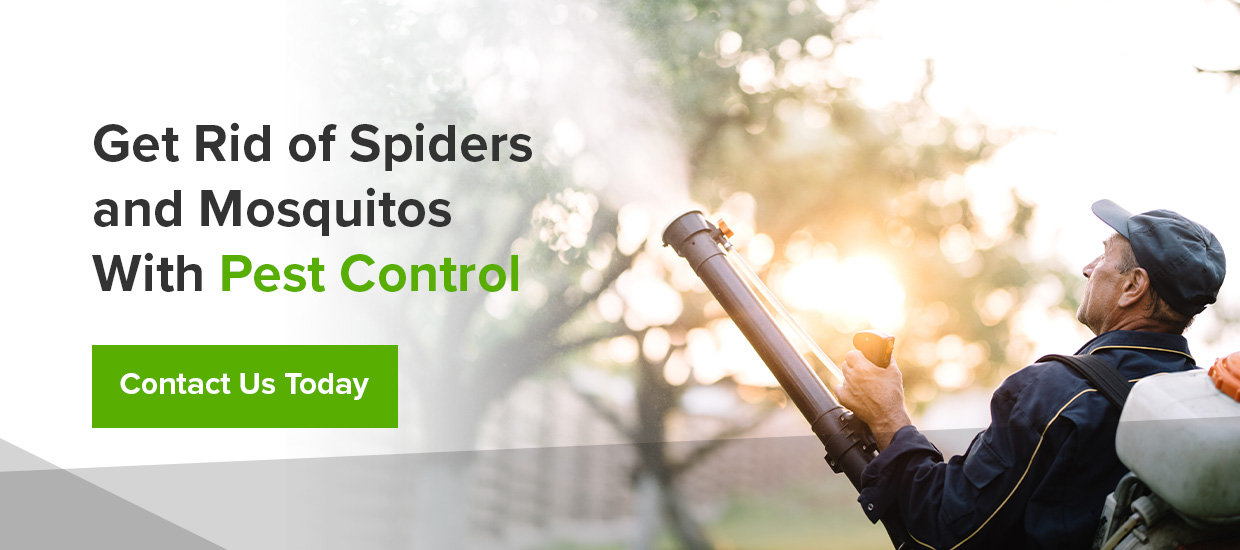So you found an itchy, red bump on your skin — is it from a spider or a mosquito? And should you be concerned? Fortunately, you probably don’t need to worry about either kind of bite unless you experience other symptoms. Both of these creatures create similar-looking bites, and knowing the difference between them can help prevent them in the future and get rid of any pests in your home or business.
Mosquito vs. Spider Bites
Both mosquito and spider bites are red, slightly raised bumps that typically itch. These similarities make it hard to tell where the bite came from. While mosquito bites are just itchy, spider bites may be painful and have one or two dark dots in the middle of the bite. These dots are fang marks, and since mosquitos don’t have fangs, they don’t leave these marks.
Your bite should go away on its own regardless of the source. If it’s swollen, try applying an ice pack in 10-minute intervals or using an over-the-counter anti-itch cream. A do-it-yourself option is to mix a tablespoon of baking soda with enough water to form a paste. Apply it to the bite for 10 minutes before washing it off.

Identifying Mosquito Bites
Mosquitos don’t actually “bite” with teeth — they use a unique part of their mouth called a proboscis to pierce the skin and inject saliva. This injection is what causes redness and swelling. Your body treats the saliva as an allergen, causing the area to swell. It may be a puffy, reddish bump or a hard, itchy bump with a reddish-brown color.
Some people have worse reactions to mosquito bites. You may have a more serious allergy if you get hives. Mosquito bites can also get infected, which causes them to get redder, feel warm and develop a streak that spreads outward. See a doctor right away if you get any of these symptoms.
In addition to the bite itself, you may also be able to figure out what kind of bite you have based on the environment. You might find mosquitos hanging around in the following places:
- Warm weather: Mosquitos hibernate or die in cold conditions, so they only emerge in warmer periods. They cannot function below 50 degrees Fahrenheit, so if something bit you in the depths of winter, you likely aren’t dealing with a mosquito. If you live in a warm climate like ours here in Texas, you might be exposed to mosquitos all year long.
- Near standing water: Mosquitos like shallow, stagnant water, like ponds, lakes and marshes. You’ll also find them near puddles, such as those in a birdbath or a forgotten kid’s pool.
- In groups: Many mosquitos fly in large groups, so you might find yourself with multiple bites. Spiders, on the other hand, usually travel solo, resulting in one bite at a time.
Mosquitos don’t bite you just for fun or even as a normal food source. Only female mosquitos feed on blood, and they do it because they use the protein from blood to develop their eggs and reproduce. A mosquito might feed on you simply because you’re there.
Identifying Spider Bites
You might be relieved to know that spider bites are quite rare in the United States. Unlike mosquitos, spiders generally won’t bite you without provocation. Bites typically occur when the spider is surprised or threatened, such as when you stick your foot into the shoe they built their home in. Most spiders don’t even have fangs that can pierce skin or venom that’s toxic to humans. Around a dozen of about 40,000 species worldwide can cause harm to humans.
Two groups of spiders can cause harm in North America. These are the widow and recluse groups, which contain black widows and brown recluses, respectively. Even these bites are rare, and one study found that out of 182 suspected bites in Southern California, only 3.8% were actually spider bites. Most were actually infections.
Like mosquito bites, spider bites often look innocuous. Bites from dangerous species usually come with noticeable symptoms, including:
- A lesion that expands or spreads
- A bullseye rash
- Tissue death, which starts as painful, purplish blisters
- Headaches and muscle aches
- Fever, with or without chills
- Nausea or vomiting
- Joint paint
- Tiredness
- Sweating
If you have a bite and any of these symptoms, see your health care provider right away. Fortunately, these bites are rarely fatal, but medical attention is still crucial.
A spider’s habitat is a little harder to predict than a mosquito’s, especially with so many different species. Although you can find them inside and outdoors, spiders usually hang out on their own and in quiet, undisturbed areas. If you’ve been clearing out the basement or doing spring cleaning, you might be more likely to find one.
How to Prevent Mosquito and Spider Bites
Since mosquitos are usually found outside, you can often prevent bites by wearing long sleeves and pants, using mosquito repellant and keeping your yard free of standing water. Still, ongoing mosquito prevention can be difficult, especially if your yard has drainage issues or you have decorative water elements like ponds or birdbaths. Professional mosquito control services can eliminate mosquitos more thoroughly.
To keep spiders at bay, try to avoid clutter in your home and seal up potential entryways, such as large gaps under doors or cracks in the walls. You can also use home remedies like spraying vinegar or leaving chestnuts in problem areas.
If you see a lot of spiders, you may have another bug problem. Since spiders feed on other bugs, a large spider presence could indicate a prime dining spot with plenty of meals. This scenario typically calls for professional pest control services to remove both types of bugs.
Get Rid of Spiders and Mosquitos With Pest Control
Even if their bites are often harmless, spiders and mosquitos should never share a home or workplace with you. Professional pest control services can keep spiders and mosquitos out of your home, yard or place of business. If you’re in East Texas, the pros at Barefoot Mosquito & Pest Control are ready to help.
We use more a more natural approach with minimal pesticides to get rid of pests and prevent them from returning. Our comprehensive approach looks at everything from food supplies and structural characteristics of the building to pest-specific repellent products and protective barriers. Whatever pests you find, our experienced team can help you get back to enjoying your space.
Contact us today to talk with an expert and start the first steps to a bug-free home or business.



